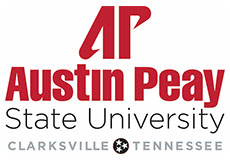 Clarksville, TN – Austin Peay State University (APSU) has worked with College Possible since 2019 to provide hundreds of first-generation college students with near-peer coaching support, and their innovative approach to student success continues to inspire national best practices.
Clarksville, TN – Austin Peay State University (APSU) has worked with College Possible since 2019 to provide hundreds of first-generation college students with near-peer coaching support, and their innovative approach to student success continues to inspire national best practices.
Representatives from Austin Peay State University recently shared their approach to near-peer coaching with 24 other universities from across the country during a College Possible webinar. Attendees represented public, private, four-year, and two-year institutions from 20 states.
APSU speakers included: Demetrius Hobbs, College Possible success coach; Mary Lawman, student success coordinator; and Jay Taylor, a rising sophomore broadcast major.
“At the heart of our organization is our mission to support students from lower-income backgrounds on their path to and through college,” said Catherine Marciano, vice president of partnerships for College Possible. “To make this happen, we utilize AmeriCorps members that serve as near-peer college success coaches. Catalyze is one of our signature program offerings, where we partner with post-secondary institutions and embed our near-peer coaching model on college campuses.”
Catalyze launched in 2016 with one pilot partner and has since grown to include 11 campuses nationwide. Last semester, Austin Peay State University’s Catalyze coaches mentored approximately 800 freshmen from first-generation or under-resourced backgrounds. Each individual coach supports around 140 students, and they live on campus so they can more easily connect with them.
“I personally like how many genuine connections we make with the students,” Hobbs said. “It’s important for them to trust me enough to tell me the things they might be struggling with … [if] they feel comfortable telling me about that, I can genuinely coach them.”
Marciano said some of the most common barriers to student retention are financial aid, major selection, and course planning – and College Possible success coaches are equipped to guide students through all three.
“We’ve seen up to 14% higher student retention overall on partner campuses where the Catalyze program is being utilized,” she said. “They supplement existing services on campus, but they do not replace them. In this way, coaches support the work of academic advisers who often have larger caseload sizes.”
Taylor said working with College Possible during his freshman year helped him navigate the Free Application for Federal Student Aid (FAFSA) when he was feeling overwhelmed.
“When I started college, I completed it with Demetrius and it made the process much easier,” he said. “He broke down what each section was, how it was significant, and why I was filling it out … as my student success coach, Demetrius helped me realize that the process is much simpler than I thought.”
Lawman said the Catalyze coaches also host annual informational sessions on financial aid to make the process easier for new students.
“What they’ve done in the last couple of years is that they’ve gamified filling out the FAFSA, and that makes it a really fun task,” she said. “They get the students together and we get it done in a game-type fashion, and the financial aid office [is there to] provide a broad education about financial aid topics and how to pay for college.”
During the webinar, Taylor and Hobbs roleplayed multiple additional scenarios to demonstrate the Catalyze program’s influence in other areas. From connecting students with campus resources to talking them through the pros and cons of changing their major, Hobbs said there are plenty of opportunities to leave an impact.
“The students we’re coaching are primarily first-year students,” Hobbs said. “Our goal is to help students become self-sufficient. That next year when they don’t have a coach, they still know how to navigate the system.”
Lawman said Austin Peay State University’s Catalyze program is further strengthened because its coaches are fully integrated within the Office of Student Success.
“For the most part, all of our coaches and advisers are in the same building and the same hallway,” she said. “Once a student is referred to another office, we stay in communication, and this is a great example of the way coaches augment our limited capacity to take on more work.”
Marciano said College Possible is also committed to providing training opportunities for its success coaches, and Austin Peay has five returning mentors ready to use what they’ve learned to support students this fall.
“Our training [is] really useful,” Hobbs said. “We had about three weeks of it, and then we also did our mid-year retreat, so we got a lot of refresher courses. I had a wonderful experience … I feel like I got to help a lot of people, make a difference, and volunteer, so it only made sense for me to come back.”



